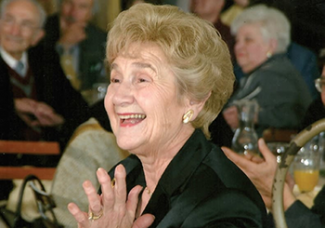Books
Non-fiction
‘A Daughter of Many Mothers,’ Rena Quint’s Remarkable Story

A Daughter of Many Mothers: Her Horrific Childhood and Wonderful Life by Rena Quint and Barbara Sofer (Self-published, 350 pp. $20)
Each Friday evening as she blesses the Shabbat candles, Rena Quint “brings to mind the mothers I have known,” she writes in her moving memoir, co-authored with Barbara Sofer, Hadassah’s Israel director of public relations and communications. In A Daughter of Many Mothers, Quint and Sofer chronicle the stories of those women.
Born Fredzya Lichtenstein in 1935 Piotrkow, Poland, Quint’s childhood was cut short by the Nazi invasion. Her birth mother, Sarah, whose face she can barely remember, was her first savior, thrusting 6-year-old Fredzya into someone else’s arms when she herself faced arrest; Sarah as well as Quint’s brothers were murdered in Treblinka. “She lets me go. She saves my life,” Quint acknowledges in a simple statement that belies the emotional deprivation that ensued.
She calls her second mother “the Teacher,” a woman to whom her father entrusted his beloved daughter when they were deported to Bergen-Belsen. The Teacher and a cadre of unnamed women protected her in the concentration camp, sheltering her from the cold and keeping her alive until the British liberated the camp.
Other mothers appeared during Fredzya’s postwar recuperation in Sweden, which had welcomed 6,000 Jews: beneficent volunteer caregivers, gentle nurses and another survivor, Anna, who had precious visas to America for herself, her son and her daughter. Tragically, the daughter died, allowing Fredzya to assume her identity and visa. Fredzya was 10 when she reached New York City with Anna, who was determined to adopt her—but then Anna died. Once again, the orphaned child was alone and abandoned. “The war is over,” she writes, “and all my mothers
are gone.”
Remarkably, another mother—as well as a father—soon appeared: generous, kind and childless Leah and Jacob Globe, both 46, who invited her to spend Shabbat with them. The search for family was over. Fredzya became Rena, a Hebrew name chosen because it means “joy,” a joy that goes on to characterize her future—college, a happy marriage, a fulfilling career, aliyah to Israel, meaningful volunteer work, speaking about her experiences at many institutions and gatherings and, most important of all, motherhood. The daughter of many mothers became the mother of four, the grandmother of 22 and a great-grandmother of 19. For Quint, a horrific childhood morphed into a wonderful life.
Quint’s story, fluidly written and threaded with scholarly references to works by psychologists, sociologists, historians and theologians, throbs with faith and hope, insight and optimism.
Gloria Goldreich’s latest book is The Bridal Chair.











 Facebook
Facebook Instagram
Instagram Twitter
Twitter
Leave a Reply